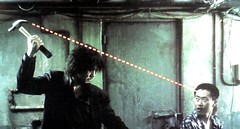I typically don't care much about the academy's opinion on entertainment, but when genre exercises garner top awards, it makes even myself sit up and take notice. So it was with Park Chan-Wook's Oldboy, a thriller from South Korea that took the highest honors at the 2004 Cannes Film Festival. It focuses on a boorish businessman named Oh Dae-su who imbibes a bit too much one night and lands in the local drunk tank, missing his young daughter's birthday. No big surprise to his friends and family. Oh Dae-su has a reputation as a tippler and womanizer, but things will change for him that night. Within minutes of his release, he finds himself abducted and locked inside a sparsely furnished room. There's no window, no cellmate, no contact with the outside world aside from a cheap television -- and he stays there for 15 years. Then one day, he's drugged and dumped on a rooftop with a new suit, a full wallet, and a cell phone. Oh Dae-su may have lost nearly two decades, but his future is crystal clear: He's going to find and kill the person responsible.
On paper, Oldboy reads like pure pulp schlock, a revenge tale filled with gruesome violence and lurid sex. Phil Villarreal of The Arizona Daily Star calls it "a virulent, heart-shattering Korean revenge opus." But despite its gruesome reputation, the movie actually shows relatively little grim content. A scene of Oh Dae-su battling a mob contents itself with a single-take long shot rather than zooming in on brutal blows. Instead of lingering on him ambushing an unaware security guard with a claw hammer, the camera freezes and draws a dotted line to the victim's cranium before cutting to the vigilante's grin. Sure, a couple moments of impromptu oral surgery (one involving the aforementioned hammer and another a pair of gardening shears) will make your toes curl, but note how much of what transpires is actually off-screen. Even the sex scenes are far less explicit that most of what you'd see on premium cable today. Park seems content to let viewers' minds fill in the details, and the approach had me squirming in delightful discomfort.
"Delightful?" you ask. Oh, yes, dear reader, because Park isn't interested in lascivious thrills. He has thematic ends in mind. Oldboy wants to you to leave hating revenge rather than reveling in it. Oh Dae-su may solemnly intone, "Vengeance has become a part of me," but he also considers himself a "monster" for what his violent impulses compel him to do. The same could also be said about the individual who masterminded his fifteen-year-long torment, and his reasons for vengeance might prove just as understandable than those of his victim. No major spoilers here. Suffice it to say that neither truly achieves his goal, and the bloody end reveals that this thriller has a cold, noirish heart at its core. In the final moments, it appears as though Park might cop out and wring some happiness from all the horror. But the final shot lands like a blow to the gut, reminding us that revenge is a dish best served not at all.
(Picture: CC 2008 by Laser Burners)
Thursday, December 12, 2013
Subscribe to:
Post Comments (Atom)



No comments:
Post a Comment